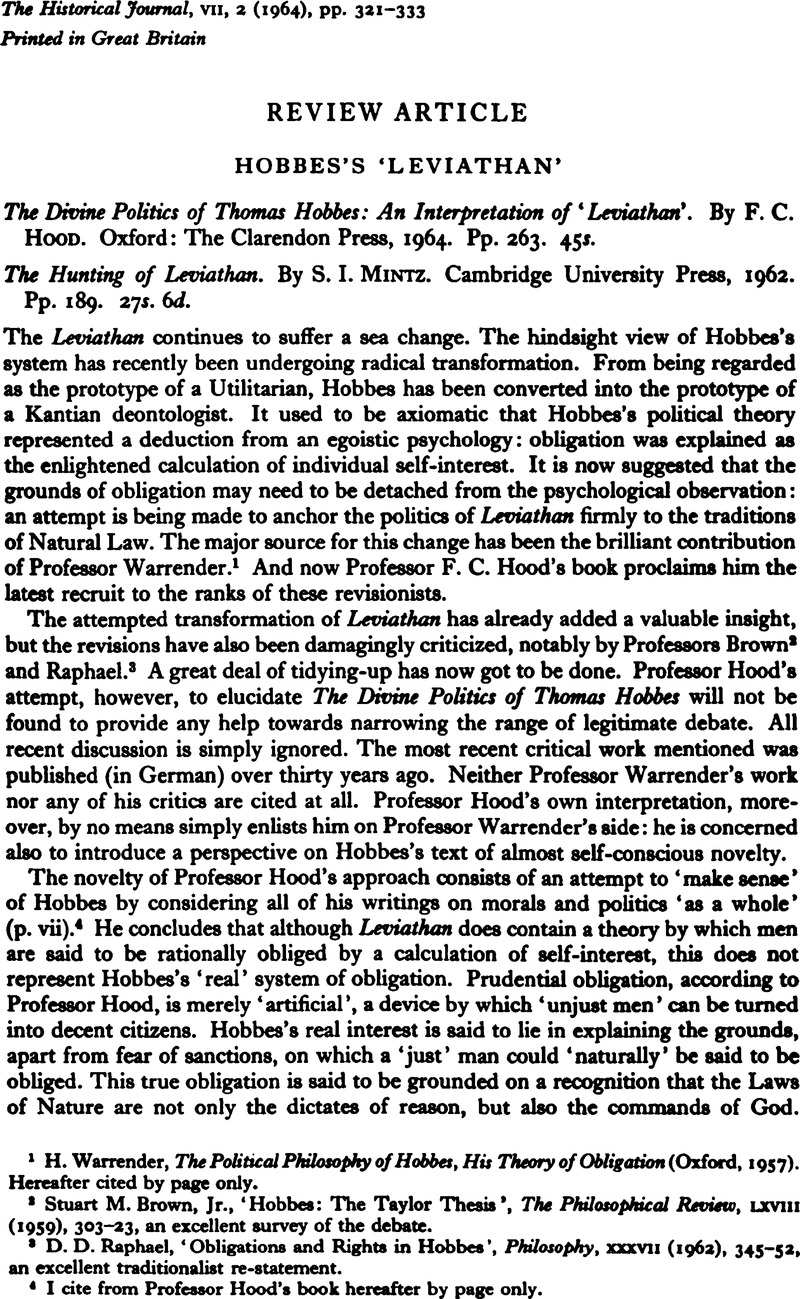
1 Warrender, H., The Political Philosophy of Hobbes, His Theory of Obligation (Oxford, 1957). Hereafter cited by page onlyGoogle Scholar.
2 Brown, Stuart M., Jr., ‘Hobbes: The Taylor Thesis’, The Philosophical Review, LXVIII(1959), 303–23. an excellent survey of the debateCrossRefGoogle Scholar.
3 Raphael, D. D., ‘Obligations and Rights in Hobbes‘, Philosophy, XXXVII (1962), 345–52, an excellent traditionalist re-statementCrossRefGoogle Scholar.
4 I cite from Professor Hood's book hereafter by page only.
5 Macpherson, C. B., The Political Theory of Possessive Individualism, Hobbes to Locke (Oxford, 1962)Google Scholar.
6 Laslett, P.,‘Market Society and Political Theory’, The Historical Journal, VII (1964), 150–4CrossRefGoogle Scholar.
7 In citing from Leviathan, I use (since Professor Hood uses) the Everyman's Library edition (London, 1914). Hereafter cited by page onlyGoogle Scholar.
8 An excellent discussion of the logical structure of Leviathan is contained in Krook, D., Mr. Brown's Note Annotated’, Political Studies, I (1953). 216–27CrossRefGoogle Scholar.
9 Professor Warrender now seems, however, to have gone beyond this point. See‘Hobbes's Conception of Morality’, Rivista Critica di Storia della Filotofia, XVII (1962), 434–49Google Scholar.
10 Oakeshott, M., Introduction to Leviathan (Basil Blackwell, 1946), pp. xliv–l. The sensitive discussionGoogle Scholar.
11 Brown, J. M., ‘A Note on Professor Oakeshott's Introduction to the Leviathan’, Political Studies, I (1953), 63Google Scholar.
12 Krook, D., loc. cit. p. 223Google Scholar.
13 Pocock, J. G. A., The History of Political Thought: a Methodological Enquiry, Philosophy, Polities and Society, ed. Laslett, P. and Runciman, W. G., Second Series (Basil Blackwell, 1962), pp. 183–202, gives an excellent account of both activities, but still seems to regard them as alternativesGoogle Scholar.
14 Professor Hood cites (p. I) this passage, from Aubrey's Life of Hobbes, but seems to regard it as bearing on the question of Hobbes's sincerity. It is evident from the MS., however (Bodleian MSS. Aubrey, 9, fo. 7), that the note refers to Hobbes's prudence. Professor Hood is quoting a mis-transcription by Aubrey's editor, Andrew Clark (Aubrey's Brief Lives (Oxford, a vols., 1898), I, 357) in which the passage is reduced to nonsense.
15 For full discussion of this doctrine as central to Hobbes's system, see Krook, D., ‘Thomas Hobbes's Doctrine of Meaning and Truth’, Philosophy, XXXI (1956), 3–22CrossRefGoogle Scholar.
16 I cite by page only